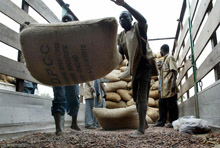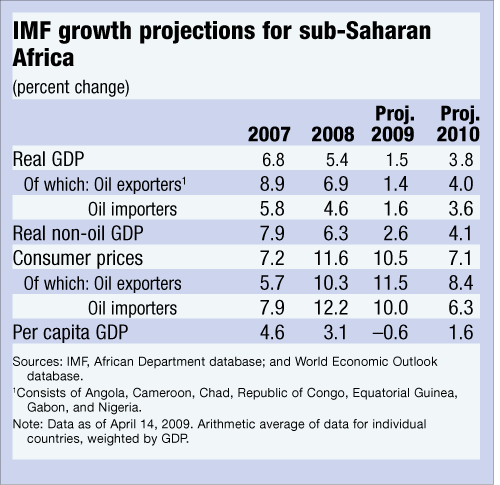
Typical street scene in Santa Ana, El Salvador. (Photo: iStock)
IMF Survey: Battered by Crisis, African Growth to Fall Sharply
April 24, 2009
- Growth in sub-Saharan Africa projected to fall to 1.5 percent in 2009
- Demand for African exports weakened by global crisis
- Countries should try to contain impact of crisis as much as possible
Hurt by the impact of the global economic recession, growth in sub-Saharan Africa is projected to decline from just under 5½ percent in 2008 to 1½ percent in 2009 before recovering to about 3¾ percent in 2010—still below its precrisis level, the IMF says in its regional outlook for the subcontinent.

Cocoa for export in San Pedro, Cote d’Ivoire: global slowdown impact includes slumping trade, commodity prices (photo: Issouf Sanogo/AFP)
REGIONAL ECONOMIC OUTLOOK
The IMF said that the abrupt slowdown puts at risk earlier hard-won gains and progress against poverty in Africa. While the appropriate policy response depends on country-specific circumstances, the priority for all sub-Saharan countries must be to contain the adverse impact of the crisis, which has resulted in slumping trade and commodity prices.
“Demand for African exports has weakened and prices for most commodity exports have fallen. Tighter global credit and investor risk aversion have led to a reversal of portfolio inflows, are discouraging foreign investment, and have made trade finance more costly. Also, remittances flows may be weakening,” said Antoinette Sayeh, Director of the IMF’s African Department, at a press briefing.
Oil exporters hit hard
The report, released on April 24, said that oil exporter’s growth would decline sharply by about 5½ percentage points to just under 1½ percent as oil production in 2009 expands only moderately amid falling oil prices and non-oil sector growth decelerates.
Oil importers’ growth would decline by 3 percentage points to just over 1½ percent in 2009 as output in South Africa contracts and export prospects weaken across the continent. In 2010 growth in oil exporters and importers will remain below pre-crisis levels, with about 4 percent and 3½ percent respectively.
Inflation is projected to fall—from about 11½ percent in 2008 to 10½ percent in 2009 and about 7 percent in 2010—as commodity prices and global demand both decline. The decline is more gradual in sub-Saharan Africa than in advanced economies largely because of incomplete pass-through of the previous surge in international oil and food prices. In some countries depreciating exchange rates are putting upward pressure on prices.

Financing is likely to remain strained because of declining capital inflows. Generally tighter global funding conditions are expected to have noticeable effects on middle-income countries, particularly South Africa and the frontier markets of Ghana, Kenya, Nigeria, and Tanzania, the report said.
It warns that a more severe economic slowdown could cause additional fiscal pressures if revenues decline significantly and additional social spending is necessary to cushion the impact on the poor. A major slowdown in trade will affect fiscal revenues directly, because many sub-Saharan African countries rely on trade taxes, and social safety nets may have to be reinforced. Uncertainty about aid flows and tighter financing conditions could further pressure sub-Saharan African budgets.
Challenges for policymakers
The crisis poses unique challenges for policymakers, heightened because it is so complex and its duration so uncertain. Some aspects of the shock, particularly lower commodity prices, may be long lasting, though some resource-rich countries may be able to use past savings to smooth the adjustment. After the first period of sustained growth in the region for decades, countries now need to adjust to lower external demand, significant swings in the terms of trade, and tighter financing conditions.
Although circumstances differ by country, a priority for all sub-Saharan African countries must be to contain the adverse impact of the crisis on economic growth and poverty, while preserving important and hard-won gains of recent years—sustainable debt levels, lower inflation, progress with liberalizing trade, and structural reforms.
Pressures to respond to weakening balance of payments positions with protectionist measures or by reverting to administrative controls need to be resisted, the report said. Economic policy through these difficult times should therefore be guided by the following principles, Sayeh stated:
• Use all available fiscal space. The global financial crisis will reduce government revenues. If the increase in the fiscal deficit can be financed, countries that have achieved macroeconomic stability and sustainable debt levels should maintain planned spending. A few countries also have scope for discretionary fiscal stimulus, such as additional social measures to protect the poor. Commodity exporters that accumulated savings during the boom may be able to adjust gradually by drawing down reserves. In countries with limited or no fiscal space, however, there may be no alternative to tightening fiscal policies in the near term. Additional donor support would ease the adjustment. Eventually, however, all countries will have to adjust to the new external environment.
• Ease monetary policy where possible and let exchange rates adjust to the external environment. Because the plunge in commodity prices should prove to be disinflationary, it may be possible for some countries to ease monetary policy. Where the terms of trade have deteriorated or capital flows are drying up, real exchange rates will have to depreciate.
• Closely monitor financial vulnerabilities and be prepared to act promptly. The impact on the region’s financial systems has been limited so far, but the economic slowdown and exchange rate volatility in some countries are likely to increase credit risk and nonperforming assets and weaken the balance sheets of financial institutions and corporations. To counter that, priorities may at times have to be reordered to emphasize short-term measures, such as intensified surveillance to facilitate early detection of risks.
International help
To carry forward the reform momentum of the past decade in the current adverse environment, Africa will need additional aid resources, at least the doubling of aid promised by the leaders of major industrialized countries at the Gleneagles Summit in 2005, Sayeh said.
Although donor countries are also under pressure, aid commitments, which constitute a small share of their budgets, should still be honored. “Without additional donor support, the necessary large expenditure cuts could set poverty reduction and economic development in Africa back by several years and might even endanger political stability in some countries,” she said.
IMF doubles access limits
The IMF has stepped up its help for low-income countries during the crisis. On April 23 it announced a doubling of borrowing limits of the poorest countries under its concessional Poverty Reduction and Growth Facility and Exogenous Shocks Facility.
The IMF’s Executive Board has also begun discussions on options for raising additional resources for concessional lending to allow the Fund to scale up its capacity to assist low-income countries over the medium term.
Comments on this article should be sent to imfsurvey@imf.org


